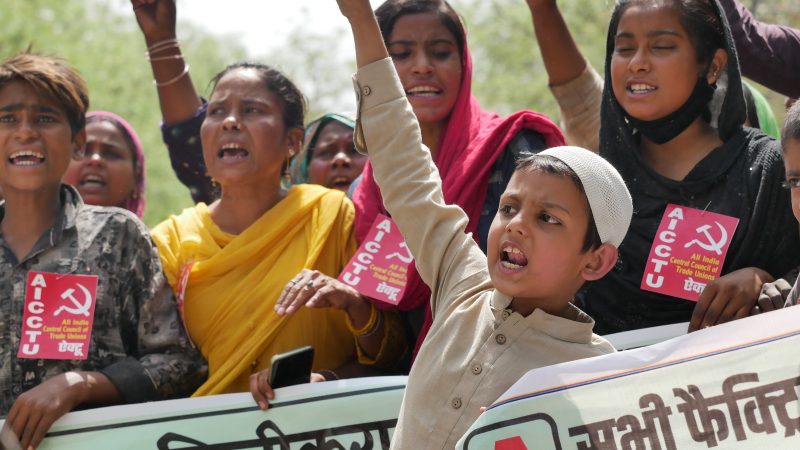
Workers in India are in urgent need of solidarity. Under the Bharatiya Janata Party (BJP) of Prime Minister Narendra Modi, the country is in the grip of an increasingly autocratic nationalist government that makes Donald Trump’s wing of the US Republican Party – whom, along with the Tories, it counts among its international friends – look moderate.
The Modi government has accelerated privatisation and attacked workers’ conditions, introducing new labour codes to weaken rights and undermine unions. Backed up by far-right street vigilantism, mass intimidation and in many cases outright violence, the regime has systematically attacked India’s already limited and unequal democracy – hounding and jailing thousands of activists and journalists, suppressing the autonomy of Kashmir and amending citizenship laws to discriminate against Muslims. India’s Muslim community, which makes up 14% of the population, faces an ever more precarious situation with some in the regime’s activist base calling openly for genocide against them.
A victory for the nationalist right anywhere is a defeat for the labour movement everywhere. Just as we support those working to defeat Trumpism in the US, Jair Bolsonaro’s movement in Brazil, and Marine Le Pen’s in France, we must support those working to defeat Modi’s in India. And in the teeth of the nationalist assault, working people in India continue to wage heroic battles for their rights.
Last year’s tremendous multi-community mass struggle by India’s farmers and farm labourers, which forced Modi to repeal his three pro-corporate agricultural ‘reforms’, showed that the BJP’s regime is not invincible. International support, including from many in the Labour Party, played an important role in that victory. Now, Labour members and trade unionists are setting up India Labour Solidarity (ILS), with the aim of raising awareness, building links and generating practical support among the labour movement for Indian comrades’ struggles. It launches with a meeting on December 6th at SOAS university in London.
We in the UK have a special duty and particular opportunities for solidarity. Not just because of the UK’s two-century colonisation, asset-stripping and oppression of India – nor the huge Indian and other South Asian communities that colonialism and its aftermath helped create here, though those factors are important. But also because of direct links between the BJP regime and the Tories.
A number of senior Tory MPs, not just of Indian-background, have close political and personal relationships with leaders of the BJP, and BJP activists here have tried energetically to swing Hindu-background voters to the Tories. Meanwhile, post-Brexit, the Tories are eager for a new trade deal with India – a trade deal being pursued and shaped regardless of human rights abuses in India (and the UK!) and at the expense of working people in both countries.
The UK labour movement, including the Labour Party, must argue for UK-India links designed to serve working people, not big business, and that strengthen rather than undermine workers’ rights and conditions, social rights and environmental protections.
We must use our voices, platforms and connections, national and international, to speak out forcefully alongside our sisters and brothers in the resistance movements in India – whether that’s trade union organising and strikes, women asserting their rights, or oppressed communities standing up against discrimination and violence.
In the UK, there is discussion about Labour’s relationship to Indian communities. As with all communities, we can rally people across divisions with a bold programme to bolster living standards and rights, attacking all forms of racism, inequality and injustice.
That must include supporting struggles against caste discrimination and oppression, including in the UK. We are proud that India Labour Solidarity’s launch meeting will take place on December 6th – a day that marks the life and work of Dr B.R. Ambedkar, independent India’s first law and justice minister and the country’s foremost fighter against caste oppression, who also laid down the first frameworks for workers’ rights and social security in India. With caste still a key determinant of occupation in India, the struggle for labour rights is closely linked with anti-caste struggles.
In setting up ILS, we are inspired by the long history of solidarity between Indian and British workers: from the election of Indian freedom fighter Shapurji Saklatvala as the first Labour MP of colour a century ago and Labour activists’ role in India’s independence, to the contribution of Indians to anti-racist and working-class struggles in Britain, including the important Grunwick and Gate Gourmet disputes led by South Asian women workers. The brave struggles of our comrades in India now, in very difficult circumstances, should also inspire us – and push us into action to support them. Encouragement and victories for them will strengthen the labour movement here too. We hope that you will join us.
ILS launch event: 6.30pm, Tuesday, December 6th, SOAS (room B104, Brunei Gallery), Thornhaugh Street, London WC1H 0XG. Speakers include Nadia Whittome MP, Indian trade unionists Nodeep Kaur and Bilal Khan, and British trade unionist Maria Exall.




More from LabourList
Government abandons plans to delay 30 local elections in England
‘The cost of living crisis is still Britain’s defining political challenge’
‘Nurses are finally getting the recognition they deserve’